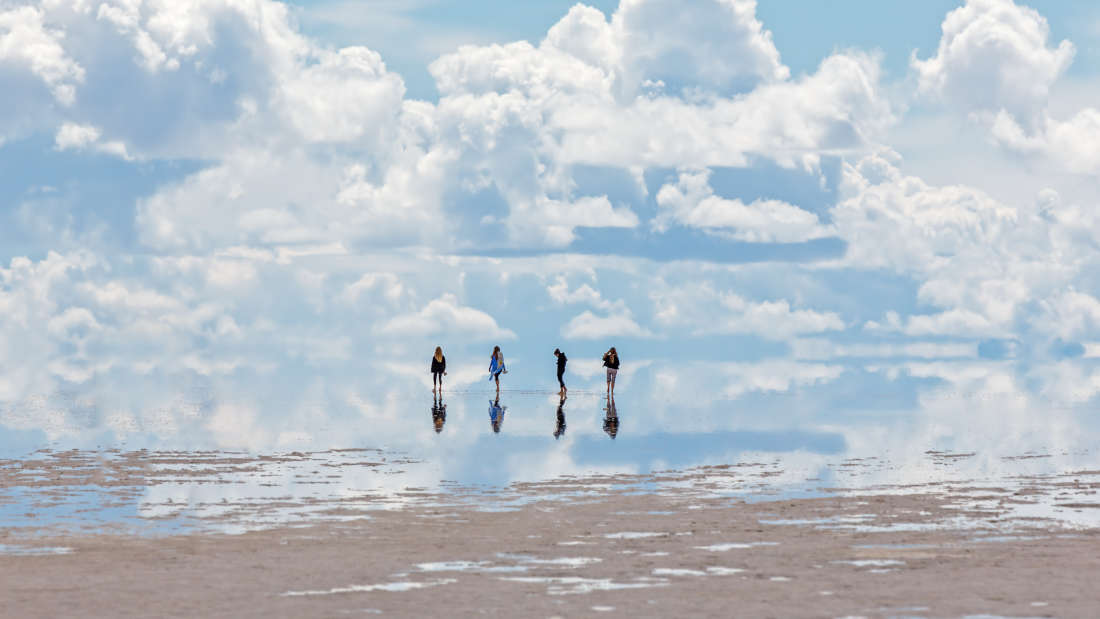Earth isn’t flat. You almost certainly knew this thanks to the insurmountable pile of evidence that has confirmed this for hundreds, if not thousands, of years. Despite that, there’s been an upsurge in those that purport to believe that the planet we call home is indeed a galactic space Frisbee, and we honestly can’t tell if people are trolling or not.
It’s one of the most easily disprovable theories out there, and yet, here we are, watching astronauts debate flat-Earthers live on national television. Ho hum.
That did get us thinking, though. What if the planet suddenly became flat? What would it actually be like to suddenly live on our cosmic coaster as we zip through the cosmos?
It’s actually a difficult question to answer. Even though we talk about the Flat Earth Theory, all capitalized, there isn’t one accepted definition of a flat Earth, would you believe.
So we’ll do the best we can with our own assumptions. If it doesn’t make sense, then honestly, it’s not our fault. We’re literally trying to make sense of senselessness, because we’re clearly masochistic.
The Great Boing Of Doom
Oh snap, the planet’s suddenly flat. This would require the mantle, inner core, and outer core of the planet to suddenly fall off into nothingness, and the Southern Hemisphere to flip up around to be level with the Northern Hemisphere.
At the same time, Antarctica – which is a giant wall around the planet designed to stop us peering over the edge, or designed to stop monsters coming up from underneath to get us – would be ripped apart and turned into a huge circle. The Arctic, meanwhile, would drop downwards at a remarkable speed.
This motion, assuming it’s fairly quick, would cause so much of the planet to accelerate then decelerate so unfathomably quickly that pretty much everyone would die in gruesome explosions, like a bag of tomatoes in a fast-moving car that suddenly crashed.
Those right on the edges may be flung off into space at a horrific speed, and they’d either burn up in the atmosphere, or they’d become space popsicles. At the same time, all those on the International Space Station (ISS) would definitely not survive as they are launched into the infinite dark.
It would be messy, and awful.
However, because of magic, we don’t all die – at least, not immediately.
As pointed out by Dr Tobias Durig, a volcanologist and postdoctoral researcher at the University of Otago, no mantle or core would also mean that we wouldn’t have a geomagnetic field either.
“This wouldn’t be only annoying for boy scouts and early time navigators (since their compasses wouldn’t be of use), but would also be bad news for any organism, since the geomagnetic field basically works as a starship deflector shield against solar radiation,” he told IFLScience.
“Living on flat Earth’s surface would be as pleasant and healthy as sitting inside a 24/7 microwave oven! Solariums would have a hard time – however, the market of sun creams and tinfoil hats would boom.”
The lack of tectonic hazards “would be good news for threatened cities like Los Angeles, San Francisco, Tokyo, and Naples. On the other hand, we would have to miss volcanic islands such as Hawaii, Bali, Okinawa, or Iceland, making holidays far less exciting.
“No tongue-breaking Icelandic volcanoes spitting ash into the atmosphere would mean no hassle at airports with grounded aircrafts anymore,” he gleefully mused, before adding that “agriculture would miss the fertile volcanic soils rich of nitrogen and phosphorus – soils which bear some of the best red wines on our planet.”
No volcanoes and terrible wine. Sounds awful.
Escaping Gravity
Gravity would still apply, as massive objects will certainly have a potent gravitational pull. However, if we’re just left with the crust, that means we only have 1 percent of the original mass of the planet left. Although the Frisbee’s gravitational field strength would be the same across the entire surface, it would be incredibly small, but would it be enough to keep us stuck to the surface?
Assuming the flat Earth is made only of continental crust, assuming that it’s the same average thickness all the way across, and assuming this is all made of granite, we can actually plug the numbers into something called Gauss’ law of gravity to get a (very) rough estimate of the Frisbee’s gravitational field strength.
Right now, in reality, the world clocks in at 9.8 meters per second squared. On a flat Earth, this would drop to a few millionths of a meter per second squared. Gauss’ law states that the closer you move to the edge – Antarctica – the greater and, weirdly, the steeper angled the gravitational pull on this strange cylindrical world would become, but it’s not clear if it would be measurable or not.
For all intents and purposes, we would no longer have any meaningful gravitational field, so as soon as we jumped, we’d drift off into outer space and die. Again.
Incidentally, our atmosphere – which is continuously being heated up by the incoming solar radiation – would now lose its gravitational anchor. Most, if not all of it, would become buoyant and drift off into outer space with us, so that’s nice.
Mixed Bag
All this death isn’t much fun, so let’s forget all that. Say gravity is fine, and we’d have an atmosphere that mysteriously sticks to the disk, like a welcome piece of chewing gum to a planet-sized wall. This, as it turns out, would annoy plenty of scientists – including Dr Dave Williams, a solar scientist at the European Space Agency.
“I’ve spent almost all my adult life investigating the Sun,” he told IFLScience, somewhat wearily. The Sun rising and setting on a flat Earth is basically impossible to explain using known physics, he added, which means that “either the Sun sets at the same time for everyone, or the Sun never sets.”
The eternal day is probably the silliest, as “those of us blessed with the gift of sight mostly agree that there’s such a thing as sunset.”
Funnily enough, a flat Earth would actually not be all bad, assuming we are still ignoring that gravitational conundrum. Williams notes that without different time zones, we’d never get jetlag, and if the Sun never did set, he’d get to investigate the science of our local star from the surface of the flat Earth 24 hours a day – whatever “24 hours” means without any rotation in which to speak of.
Incidentally, it’s difficult to know precisely how animals – particularly migratory ones – would react to a suddenly flat Earth. The lack of any distinct seasons, along with the sudden positional changes of many of the world’s landmasses, would ensure that creatures as diverse as wildebeest, Atlantic salmon, and the Mexican free-tailed bat would end up confused, miserable, and dead.
“One way of looking at the global climate is a series of impenetrable yet invisible barriers,” Dr Ben Libberton, a microbiologist and science communicator at the MAX IV Laboratory in Lund, Sweden. “Animals, insects and even microbes are kept in certain parts of the globe because they simply wouldn’t survive if the climate was different.”
On a flat Earth, however, the barriers would drop. Animals could move around more easily, and their microbes would move with them.
“When we see migration of these vectors on a small scale, it can result in catastrophic outbreaks of disease,” Libberton adds.
“The earth suddenly becoming flat would allow this to happen on a larger scale and in multiple places at the same time. It would be like each city in the world starring in its own outbreak movie.”
Even the microbes themselves would be in trouble. Despite being famously hardy, a flat Earth would rid the planet of plenty of their living quarters, even those extremophiles living around hydrothermal vents. Overall, the biodiversity on Earth would crash out, which “could take a whole ecosystem with it.”
“This is bad for us, especially when we rely on those ecosystems for fixing nitrogen and carbon as well as producing oxygen,” Libberton pointes out. He then adds, almost nonchalantly: “Maybe the microbes will eventually choke us all to death.”
Geostorm
What of the weather, and the climate? Surely a flat Earth would cause nothing short of meteorological pandemonium, we thought. To double check, we asked several experts over at the Finnish Meteorological Institute, including Doctors Antti Lipponen and Tero Mielonen, and it’s safe to say that they relished the opportunity.
“The situation is quite difficult to think about as there are many ways the flat Earth could be oriented relative to the Sun and, as expected, all scenarios we thought of had problems,” they wrote.
They agreed that if there was no atmosphere there would be no weather, but assuming there somehow was one, weather on a flat Earth would be utterly stupid. “The seasons are caused by the tilted axis of the Earth, so in a flat Earth scenario there would be no seasons.”
Even the distinction between day and night would be decidedly blurry. They assume that the Earth is rotating like a coin on a table, which means that the underside of the world would be heated more in some instances during its day, and vice versa at night. This enormous difference in heating would trigger the appearance of powerful nightside-to-dayside winds, which don’t sound very pleasant.
“In one scenario, the Sun would be some kind of flashlight-like light source and it would bring light and heat the planet in a ‘rotating pattern’ to make day and night possible,” they suggested, something which has been used by flat Earthers as an argument before. In this case, the Sun would appear to shrink and grow in the sky, which would look extremely trippy.
“In this scenario, we thought that the Earth is not rotating and therefore there is no Coriolis effect. This would mean that hurricanes would not be possible, or would at least extremely rare,” they explained, which actually sounds not that terrible.
As a bonus, the regional weather would be calmer without the Coriolis effect, so “in this kind of scenario, a normal day would probably be that kind of nice sunny summer day that everybody would enjoy.” Aw, that’s lovely.
“Maybe it is just easier to stick with the idea of round Earth and just accept that the Earth is round,” the pair concluded, somewhat exasperated. “This makes things so much easier!”
We couldn’t agree more.
Source: iflscience.com
Ask me anything
Explore related questions





